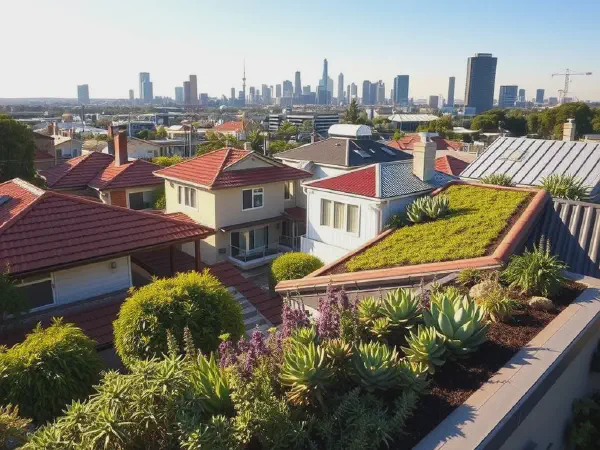Essential Guide to Roof Replacement in Melbourne

Roof Replacement Melbourne: A Comprehensive Guide
Roof replacement in Melbourne is essential for homeowners looking to maintain the safety and integrity of their buildings. With the city's unique climate and weather patterns, upgrading or replacing an aging roof becomes more than just an aesthetic decision; it is crucial for protecting the property from harsh weather conditions. This guide delves into the many aspects of roof replacement, from types of materials to cost factors, to help homeowners make informed decisions.
Choosing experienced metal roofing contractors melbourne can significantly enhance the durability and value of your home.
When considering roof replacement in Melbourne, homeowners must first assess their current roof's condition. Factors such as leaks, missing shingles, and signs of wear can indicate the need for replacement. Additionally, it's essential to consider the benefits of a new roof, such as improved energy efficiency, enhanced curb appeal, and increased property value. This comprehensive guide aims to provide valuable insights into the entire roof replacement process and what homeowners should expect.
In Melbourne, various roofing materials are available, offering homeowners a range of choices depending on budget, style, and durability. It's important to evaluate these options carefully to ensure the selected roofing material aligns with both the aesthetic desires and practical needs of the home. Moreover, Melbourne's specific climate factors, including its rainfall and intense sunlight, play a critical role in choosing the right roofing material for replacement.
For homeowners in need of a reliable upgrade, roof replacement northern suburbs melbourne ensures longevity and aesthetic appeal to any property.
Understanding the cost factors associated with roof replacement in Melbourne is crucial for budgeting appropriately. The average costs can vary based on the type of materials selected, the size of the roof, and the complexity of the installation. Homeowners should be aware of potential hidden costs and plan accordingly to avoid financial surprises during the project. This guide will break down the essential cost contributors for a successful roof replacement.
Finding reliable contractors for roof replacement in Melbourne is vital to ensure high-quality workmanship and satisfaction with the finished product. Homeowners should take the time to research local contractors, checking credentials, and reading reviews to find trustworthy professionals. Furthermore, understanding the necessary permits and regulations surrounding roof replacement can prevent delays and legal issues during the project.
Types of Roofing Materials for Replacement
Homeowners considering roof replacement in Melbourne must explore various roofing material options. Two popular choices are asphalt shingles and metal roofing. Asphalt shingles are affordable, lightweight, and available in various colors and styles, making them an attractive option for many homeowners. However, their lifespan is generally shorter compared to some metal roofing options, which boast greater durability and a longer lifespan, often needing less maintenance over time.
Tile roofing is another common choice for Melbourne homes, providing a distinctive aesthetic appeal and excellent thermal performance. Clay and concrete tiles are popular options that not only enhance curb appeal but also offer impressive longevity and resistance to termite infestations. They can withstand Melbourne's varying weather conditions, making them an excellent investment for homeowners seeking lasting quality.
Slate roofs, known for their unmatched durability, require minimal maintenance and can last for over a century. While this premium roofing material is more expensive upfront, its longevity and resilience against the elements make it a worthy investment for some homeowners. Melbourne's climate, with its occasional strong winds and heavy rainfall, can benefit from the robustness of slate roofs.
Eco-friendly roofing materials have gained popularity among environmentally conscious homeowners. Options, such as bamboo shingles or recycled metal, are available for those seeking sustainable alternatives. Moreover, green roofs, which involve the integration of vegetation, can reduce heat absorption and improve insulation. These eco-friendly options not only contribute to a healthier planet but can also enhance energy efficiency in the home.
When considering roof replacement materials, cost comparisons should be part of the decision-making process. Asphalt shingles may be the most budget-friendly option upfront; however, materials like metal or slate could provide long-term savings due to their longevity and low maintenance requirements. Homeowners should evaluate not only the initial costs but also the potential return on investment over time.
Cost Factors in Roof Replacement
The average cost of roof replacement in Melbourne varies significantly, ranging between $5,000 to $20,000, depending on several factors such as roofing material, the size of the home, and the complexity of the project. Homeowners should also factor in the costs associated with labor, which can make up a significant portion of the total expense. It's advisable to gather multiple quotes from contractors to get a clearer picture of the market rates.
Several factors can influence roofing prices, including the type of material selected, the roof's pitch, and any necessary structural repairs or upgrades. Additionally, the roof's accessibility can impact labor costs, as roofs that are difficult to access will require more time and effort from contractors. Homeowners should consider these aspects when obtaining quotes.
Hidden costs can often arise during roof replacement projects, making it vital for homeowners to conduct thorough inspections before the work begins. Common hidden costs may include unexpected structural repairs, replacement of rotten wood, or issues that arise during the removal of old roofing materials. To prevent budgetary surprises, it’s essential to have a comprehensive understanding of the existing roof's condition.
Budgeting for roof replacement is critical to avoid financial strain. Homeowners should analyze their financial situation and possibly set aside a contingency fund to cover unexpected expenses. It is also helpful to prioritize necessary repairs and think long-term about the investment’s value, focusing on the roof's lifespan and energy efficiency potential.
Financing options for roof replacement can alleviate the burden of upfront costs for homeowners. Many contractors offer payment plans or financing programs, making the replacement more affordable over time. Additionally, some local governments and organizations may provide grants or low-interest loans for energy-efficient roofing materials, helping homeowners save money while improving their homes.
Finding Reliable Roof Replacement Contractors
When searching for reliable roof replacement contractors in Melbourne, homeowners should start by checking credentials, licenses, and insurance. Ensuring that a contractor has the necessary qualifications and that their business adheres to local regulations can provide peace of mind. It's essential to verify that the contractor has liability insurance and worker's compensation to cover any accidents or damage during the project.
Reading customer reviews and testimonials can offer insights into contractors' reputations and reliability. Homeowners should seek recommendations from friends and family, as well as consult online review platforms to gauge overall customer satisfaction. Look for consistent feedback regarding workmanship, timeliness, and responsiveness to concerns raised during the project.
When interviewing potential contractors, homeowners should prepare key questions to ask. Inquiring about their experience, the estimated timeline for completion, and what warranties they provide can offer important insights. Homeowners should also assess how well the contractor communicates and whether they seem open to answering questions and addressing concerns.
Understanding warranties and guarantees is an essential aspect of selecting a roofing contractor. A reliable contractor should offer a warranty on both the labor and materials used in the project. Homeowners should take the time to review warranty details, including what is covered, duration, and any limitations, ensuring they protect their investment effectively.
Deciding between local and national roofing companies is a significant choice for homeowners. While national companies may offer broader resources and standardized services, local companies might provide personalized service and a better understanding of Melbourne's specific requirements. Assessing the track record and community engagement of local contractors can influence this decision.
Permits and Regulations for Roof Replacement
Understanding local building codes in Melbourne is crucial for homeowners considering roof replacement. Familiarizing themselves with the requirements ensures compliance and avoids potential fines or project delays. Local councils can provide guidance on pertinent regulations to ensure their projects are executed legally and efficiently.
Permits are often required for roofing work in Melbourne, varying based on the project's size and scope. Homeowners should consult the local council to determine what permits they need before beginning any work. Failure to obtain the proper permits may result in costly penalties or forced removal of non-compliant work.
Liability and insurance for roofing contractors should also be a priority for homeowners. Ensuring that the contractor carries adequate insurance protects homeowners against liability in case of accidents during the project. Homeowners should request proof of insurance and verify that it remains valid throughout the duration of the work.
Zoning laws can impact roofing projects, particularly regarding height restrictions and design specifications for specific neighborhoods. Homeowners must become familiar with local zoning regulations to avoid disputes or complications during roof replacement. Engaging with local authorities can help ensure that the planned work is compliant with such laws.
Environmental regulations may also affect roofing materials and disposal processes. Homeowners should ensure that their chosen materials adhere to any sustainability regulations, which may influence the selection of roofing material options. Understanding these environmental guidelines can also aid in responsibly disposing of old roofing materials during the replacement process.
Roof Replacement Process Overview
The roof replacement process involves several steps, starting with an initial inspection to assess the roof's condition. Once the homeowner selects their materials and contractor, the project will typically involve removing the old roof, making necessary repairs, and installing the new roofing material. Communication between the contractor and homeowner throughout this process ensures a successful outcome.
The timeline for a typical roof replacement in Melbourne varies depending on several factors, including the size of the house and the roofing material chosen. On average, a full roof replacement can take anywhere from a few days to a couple of weeks to complete. Homeowners should discuss the expected timeline with their contractor to manage expectations effectively.
Safety measures during roof replacement are critical to protecting both the homeowners and the workers involved. Quality contractors will implement safety protocols, including using proper equipment, staging, and fall protection measures. Homeowners should ensure that their contractors prioritize safety to avoid accidents and ensure a smooth project.
Post-replacement inspections and maintenance play a vital role in sustaining the longevity of a new roof. Homeowners should plan for a thorough inspection once the project is complete to identify any potential issues. Regular upkeep, such as clearing gutters and checking for debris, can help prolong the roof's lifespan and prevent costly repairs in the future.
Common issues to watch for after roof replacement include leaks, sagging, or cracks in the roofing material. Homeowners should perform routine inspections and address any concerns promptly to maintain the integrity of the new roof. Staying vigilant about potential issues will enhance the effectiveness of the roof replacement long after the project is complete.
